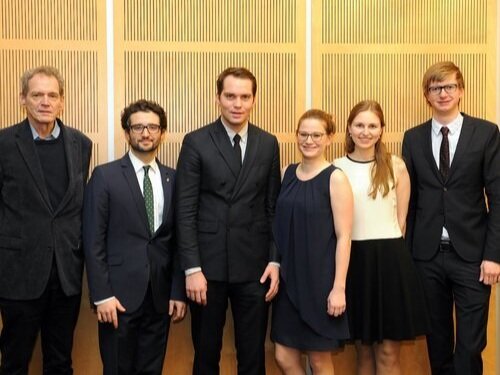Obermayer German Jewish History Award
Hans-Eberhard Berkemann
Bad Sobernheim, Rhineland-Palatinate
After a local Jewish cemetery was repeatedly vandalized, Hans-Eberhard Berkemann, an expert in the preservation of monuments, oversaw its restoration. In 1992, when a street was going to be built across an unused part of the cemetery, he successfully fought against it. A year later, in Staudernheim, he found out that the synagogue was going to be auctioned off. He bought it himself for 10,000 DM because a local preservation committee didn’t have enough money. “It was a chance you get only once in 50 years,” Berkemann remembers. He sold it to the committee once it had raised enough money.
Berkemann, who teaches elementary school students, leads tours through local Jewish landmarks. Still, his greatest efforts have been reserved for the Bad Sobernheim synagogue. After World War II, it fell into disrepair and was used to store furniture and groceries. In 1981, he heard that the building would be torn down. For two years, he pressed authorities to declare the synagogue a protected monument, all the while worrying that it would be destroyed. “For some time, I went every morning to the building,” he recalls. “I wanted to stop the cranes.” He finally convinced them, but it took a town lawsuit against the owner to make it happen. In 1989, he and others founded a “synagogue verein,” a committee for the preservation of the synagogue, which pressed for the town to purchase the building despite some opposition by Bad Sobernheim officials.
In March 2002, after two decades of struggle, the synagogue verein signed a contract with the town allowing the organization to use the Bad Sobernheim building. After raising money to restore it, the committee plans to make it a kind of community center rather than a traditional museum. Berkemann wants it to be a place for both Jews and non-Jews, with concerts, lectures and a library in addition to documentation of Bad Sobernheim’s Jewish culture. “A museum would admit it’s all over,” he says. “I want the house to be full of life.”
Normally, Hans-Eberhard Berkemann is a soft-spoken man. But when his principles are violated, the preacher’s son raises his voice and fights—even if it takes more than 20 years to be heard. One of his most closely held beliefs is that all places of worship are sacrosanct. So when Berkemann, now 59, found out that general reconstruction in his hometown of Bad Sobernheim meant to claim a former synagogue, his reaction was instinctive. “It was absolutely against the values I was taught that a house of God—whether it was being used or not—would be torn down,” he said.
Though he was often an army of one, he used all manner of strategies to prevent the synagogue’s destruction. He twisted people’s arms, butted heads with community leaders, recruited allies and pestered officials into legal action. And Bad Sobernheim’s building is not the only one he has saved. In 1993, he helped rescue a synagogue in neighboring Staudernheim. He also has been involved in other activities: co-publishing a magazine on Jewish history, organizing exhibitions and commemoration ceremonies, and documenting every gravestone—names, dates, inscriptions and familial relations included—in Bad Sobernheim’s Jewish cemetery, as well as eight others.
Berkemann impressed many people not only with what he achieved, but how. “He gets furious when he thinks things are not right,” says Margrit Schneeweiss, whose family once lived in Bad Sobernheim. “He doesn’t have long discussions; he acts.” Mayor Hans-Georg Janneck describes him as “charming and persistent, just like you have to be if you really want to be successful.” Courage of conviction was drilled into Berkemann by his family. His grandfather opposed the Nazis and was beaten for it in 1933. His father preached against them and narrowly escaped arrest by the Gestapo. “For your convictions, you have to do something,” Berkemann says. “You must not hide when facing opposition.” He was always there when help was needed.
THIS WALL BRINGS PEOPLE TOGETHER
Students at this Berlin elementary school, built on the site of a synagogue, have been building a wall for the past two decades. It delivers a powerful message about community.
STUDENTS REACHING STUDENTS
When a handful of ninth graders from Berlin met Rolf Joseph in 2003, they were inspired by his harrowing tales of surviving the Holocaust. So inspired that they wrote a popular book about his life. Today the Joseph Group helps students educate each other on Jewish history.
“I SPEAK FOR THOSE WHO CANNOT SPEAK”
Margot Friedländer’s autobiography details her struggles as a Jew hiding in Berlin during World War II. Now 96, she speaks powerfully about the events that shaped her life and their relevance today.



